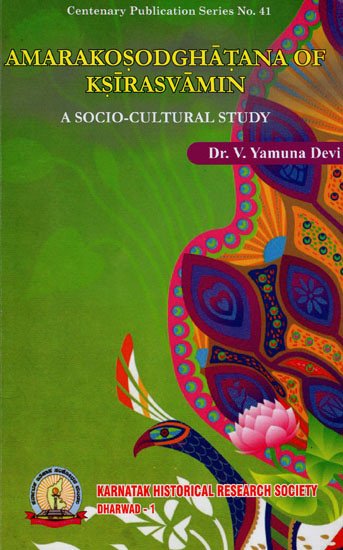Amarakoshodghatana of Kshirasvamin (study)
by A. Yamuna Devi | 2012 | 77,297 words | ISBN-13: 9788193658048
This page relates ‘Deviation from convention (Introduction)’ of the study on the Amarakoshodghatana of Kshirasvamin (in English) which represents a commentary on the Amarakosha of Amarasimha. These ancient texts belong the Kosha or “lexicography” category of Sanskrit literature which deals with the analysis and meaning of technical words from a variety of subjects, such as cosmology, anatomy, medicine, hygiene. The Amarakosa itself is one of the earliest of such text, dating from the 6th century A.D., while the Amarakoshodghatana is the earliest known commentary on that work.
Deviation from convention (Introduction)
In section VI. 1 it had been shown though briefly that Kṣīrasvāmin follows Pāṇini throughout his commentary; it could be percieved in the analysis presented in the previous chapters also. Still, there are some places where he seems to deviate from the strictures of Pāṇini and takes recourse to different rules of derivations given by Pāṇini himself. Some of these instances, are discussed here. Most of the later commentators cite Kṣīrasvāmin's statements as authority. But none had so seriously discussed Kṣīrasvāmin's derivations as Bhānuji Dīkṣita. In this connection, sample of the criticisms of Bhānuji Dīkṣita with regard to Kṣīrasvāmin's such unconventional methods of deriving words are discussed.
Bhānuji Dīkṣita , a descendant of Bhaṭṭoji Dīkṣita, the author of Siddhāntakaumudī, is Pāṇini's ardent follower in the grammatical tradition. This traditions takes to authority the Munitrayas–Pāṇini, Kātyāyana and Patañjali and the Kāśikā and Siddhāntakaumudī that have adapted the rules of Pāṇini to suit the linguistic changes over a period of time.
In his commentary on Amarakośa, Bhānuji Dīkṣita derives every word strictly in Paninian tradition. Bhānuji Dīkṣita is a scholar, updated with the texts and commentaries of his predecessors and he marks the instances with criticisms or even corrects the statements or derivation of the earlier commentators especially Kṣīrasvāmin and Mukuṭa. These remarks of Bhānuji Dīkṣita can be grouped under three catagories namely (i) mere citations of Kṣīrasvāmin's remarks (ii) noted by Bhānuji Dīkṣita as cintya or to be thought upon and (iii) critical comments by Bhānuji Dīkṣita
[(i) Mere citations of Kṣīrasvāmin's remarks:]
| sphaṭāyāṃ tu phaṇā dvayoḥ | (1.7.10.p.59) | dvayoḥ ityanena sphaṭā āpi sambadhyate—iti svāmī || (1.8.9.p.90). |
| āmanasyaṃ—Pain of labour (1.8.3; p.60) | āmanaso bhāvaḥ āmanasyam | brāhmaṇāditvāt (5.1.124.) | ṣyañ iti svāmī | (1.9.3.p.92). |
| madhūlakaḥ (2.4.28.p.86) Water Bassia |
madhūko'nyo madhūlastu jalajodīrghapatrakaḥ iti svāmī || (2.4.28.p.137). |
| mallikākṣaḥ (2.5.24.p.129) | iti mallikākṣaḥ—iti svāmī | bahuvrīhau sakthyakṣṇoḥ (5.4.113). iti ṣac || (2.5.24.p.196). |
| ḍimbaḥ (2.5.39.p132) | ḍīṅ ātmanepaditvāt—ḍayati—iti svāmī—ḍayanaṃ ḍīḥ || (2.5.38.p.201). |
| punarbhūḥ (2.6.23.p.138) | punarbhūrpatiruktaśca punarbhūrdidhiṣūstathā ityeṣo'pyūdanta iti svāmī || (2.6.23.p.210). |
[(ii) Cases which Bhānuji Dīkṣita remarks as to be ‘considered’ (cintya) without any discussion:]
| kuthaḥ (2.4.166.p.123) | kuthati kuthaḥ || | kuthati iti svāmyukta vigrahaścintyaḥ || (2.4.166.p.184) |
| kadalī (2.5.9.p.126) | ke dalati kadalī | kande līyate kandalī innantau | | āta eva—innantāvetau—iti svāmī cintyaḥ || (2.5.9.p.190). |
| pṛthukaḥ (2.5.39.p.132) Young animal |
prathate vardhate pṛthu kāyati vā pṛthukaḥ | | pṛthu kāyati—iti svāmimukuṭau cintyau || (2.5.38.p.201). |
| āturaḥ (2.6.58.p.146) | ātorati | āturaḥ | ātarati rogaṃ vā | ātorati | āturaḥ | ātarati rogaṃ vā—itisvāṃyapi cintyaḥ || (2.6.58.p.221). |
| paṭo'strī (2.6.116.p.158) | paṭati vistīryate paṭam | āstrī iti cintyam | dvayoradarśanāt | āstrī iti cintyam | dvayoradarśanāt—iti svāmyeva cintyaḥ | ukta rabhasamedinyoḥ āstrī iti darśanāt || (2.6.116.p.243) |
| chandaḥ (3.3.232.p.328) | chandati chandaḥ | | chandati chandaḥ |-iti svāmimukuṭoktau vigrahaścintyaḥ || (3.3.232.p.438). |
